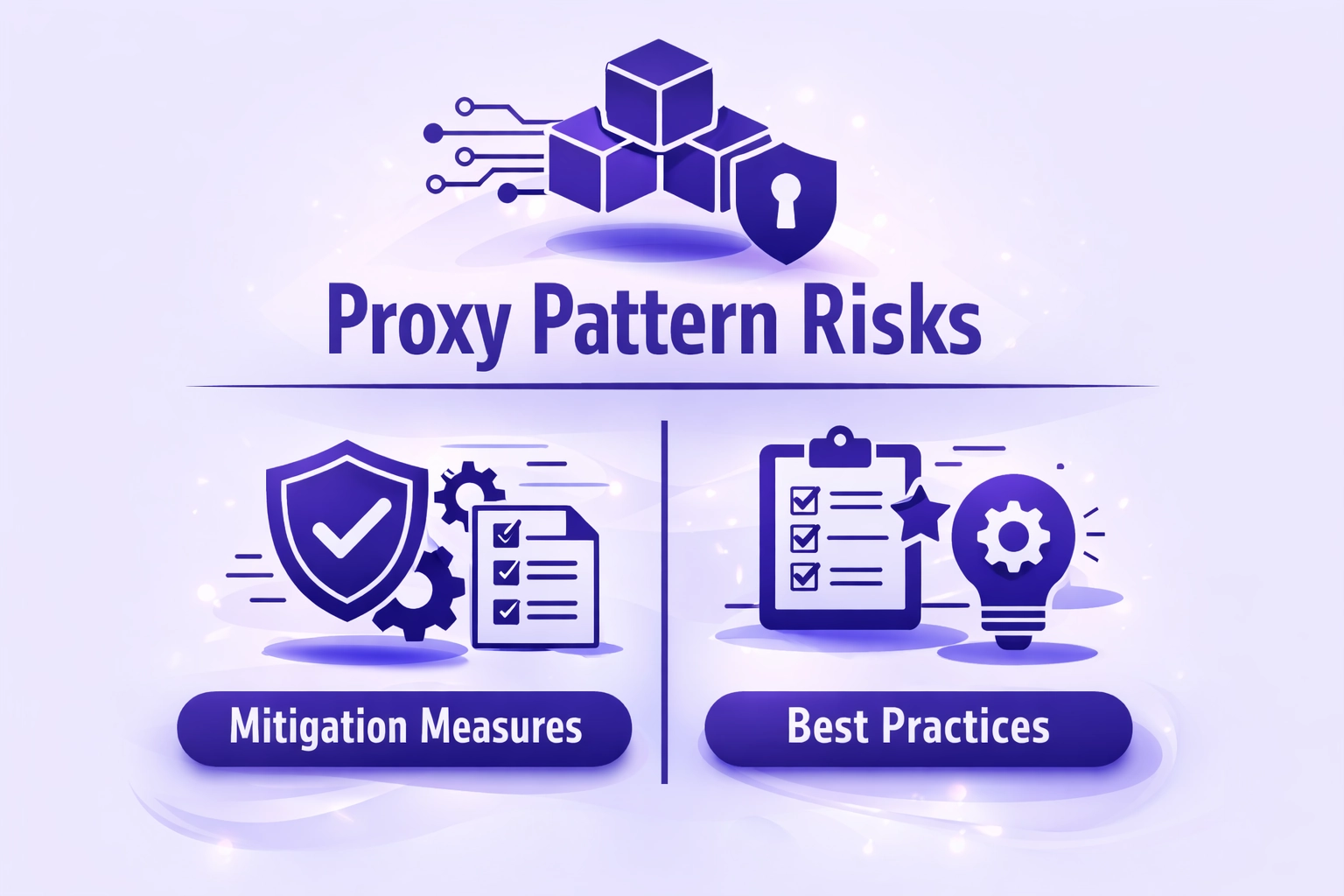Key Takeaways
- Smart contract risks have caused over $6 billion in losses since 2016, making security assessment essential for all blockchain projects worldwide.
- Immutability means smart contract risks cannot be easily fixed post-deployment, requiring thorough pre-launch audits and testing procedures.
- Reentrancy attacks remain among the most dangerous smart contract, responsible for major exploits including The DAO’s $60 million loss.
- Flash loan attacks exploit smart contract risks by manipulating prices and logic within single transactions, requiring specialized defenses.
- Oracle dependencies introduce external smart contract risks that can compromise even well-audited protocols through data manipulation vectors.
- Enterprises across USA, UK, UAE, and Canada increasingly recognize smart contract as critical compliance and operational concerns.
- Comprehensive testing covering unit, integration, and security assessments reduces smart contract risks significantly before mainnet deployment.
- Upgradability features designed to fix smart contract risks can become vulnerabilities themselves if access controls are improperly configured.
Smart Contracts Are Immutable – Mistakes Can’t Be Fixed Easily
Smart contract risks become particularly severe due to blockchain’s immutable nature. Once deployed, contract code cannot be modified or patched like traditional software. With over eight years of experience securing blockchain projects across USA, UK, UAE, and Canadian markets, our agency has witnessed how this fundamental characteristic transforms minor bugs into permanent vulnerabilities. When smart contract materialize after deployment, teams face extremely limited options: deploying entirely new contracts, implementing complex migration strategies, or accepting permanent losses. This immutability makes pre-deployment security measures absolutely critical for any blockchain project.
A Single Line of Buggy Code Can Lock or Lose Millions
Smart contract risks often concentrate in surprisingly small code sections. The Parity wallet incident locked $280 million due to a single vulnerable function. One incorrect operator or missing validation check can create smart contract that attackers exploit within minutes of discovery. DeFi protocols managing hundreds of millions in assets depend on every line functioning correctly. This concentration of risk emphasizes why professional audits and formal verification are essential investments, not optional expenses.
Reentrancy Attacks Remain One of the Most Dangerous Threats
How It Works
- Attacker calls withdraw function
- Contract sends ETH before updating state
- Fallback function re-enters contract
- Drains entire contract balance
Historical Impact
- The DAO: $60M lost (2016)
- Cream Finance: $130M (2021)
- Rari Capital: $80M (2022)
- Continues threatening DeFi
Prevention Methods
- Checks-Effects-Interactions pattern
- ReentrancyGuard modifier
- State updates before transfers
- Pull payment patterns
Poorly Written Logic Leads to Exploitable Loopholes
| Logic Error Type | Description | Potential Impact |
|---|---|---|
| Off-by-One Errors | Loop boundaries incorrect | Skipped or extra iterations |
| Incorrect Comparisons | Wrong operators used | Bypassed access controls |
| Missing Validations | Unchecked user inputs | Arbitrary value injection |
| State Inconsistencies | Improper state management | Double-spending scenarios |
| Race Conditions | Transaction ordering exploits | Front-running attacks |
Lack of Standardized Security Practices Increases Risk
The blockchain industry lacks universally enforced security standards, amplifying smart contract risks across projects. While organizations like OpenZeppelin provide security guidelines and auditable libraries, adoption remains voluntary. Projects across USA, UK, UAE, and Canada often deploy contracts without following established best practices, creating preventable vulnerabilities. This inconsistency in security approaches means users cannot assume any smart contract meets minimum safety requirements without explicit verification.
Industry Warning: Over 60% of deployed smart contracts have never undergone professional security audits.
Unchecked External Contract Dependencies Can Be Malicious
| Dependency Risk | Attack Vector | Mitigation Strategy |
|---|---|---|
| Malicious Libraries | Backdoor code in imports | Verify source code directly |
| Upgradeable Proxies | Owner changes implementation | Check proxy admin controls |
| Token Contracts | Fake tokens, fee-on-transfer | Whitelist verified tokens |
| External Calls | Callback manipulation | Use low-level call guards |
Integer Overflow and Underflow Vulnerabilities Still Exist
While Solidity 0.8+ provides native overflow protection, smart contract risks from integer vulnerabilities persist. Legacy contracts, unchecked blocks for gas optimization, and cross-chain bridges using older code remain vulnerable. The BatchOverflow attack exploited these smart contract to create unlimited tokens, demonstrating catastrophic potential. Organizations must audit all arithmetic operations regardless of Solidity version.
Lost to Overflow Exploits
Tokens Affected (2018)
Safe Solidity Version
Eliminate Smart Contract Risks Before Launch
Our security experts identify and remediate smart contract risks through comprehensive auditing. Protect your users and reputation with professional assessment.
Flash Loan Attacks Can Manipulate Smart Contract Logic
Flash loan attacks represent sophisticated smart contract risks that exploit DeFi composability. Attackers borrow massive amounts without collateral, manipulate prices or governance, and repay within single transactions. These attacks have drained hundreds of millions from protocols across USA, UK, UAE, and Canadian markets. Defending against flash loan smart contract requires careful oracle design, time-weighted pricing, and flash loan-resistant architecture patterns.
Smart Contract Risk Mitigation Lifecycle
Threat Modeling
Identify potential smart contract and attack vectors before writing any code.
Secure Design
Architect contract structure using established security patterns and best practices.
Code Implementation
Write clean, documented code following security guidelines to minimize smart contract risks.
Unit Testing
Test individual functions with comprehensive edge cases and boundary conditions.
Security Audit
Engage professional auditors to identify smart contract through manual review.
Bug Bounty
Launch public bounty program incentivizing researchers to discover remaining vulnerabilities.
Staged Deployment
Deploy with limited caps and gradually increase as confidence in security grows.
Continuous Monitoring
Monitor live contracts for anomalies and respond rapidly to emerging smart contract risks.
Inadequate Testing Before Deployment Causes Catastrophic Failures
Insufficient testing represents one of the most preventable sources of smart contract. Many projects rush to deployment without comprehensive test coverage, fuzz testing, or integration testing. The Compound governance incident that distributed $90 million incorrectly could have been prevented with proper testing. Our agency requires minimum 95% test coverage with specific focus on edge cases and attack scenarios before any mainnet deployment.[1]

Upgradability Features Can Become Backdoors if Misused
Proxy Pattern Risks
- Admin key compromise
- Malicious upgrades possible
- Storage collision issues
- Implementation backdoors
Mitigation Measures
- Multi-signature admin controls
- Timelock delays on upgrades
- Transparent upgrade processes
- Community governance approval
Best Practices
- UUPS over Transparent proxy
- Audit all implementations
- Storage gap reservations
- Immutability when possible
Oracles Introduce Off-Chain Data Manipulation Risks
| Oracle Risk Type | Attack Method | Defense Strategy |
|---|---|---|
| Price Manipulation | Flash loan market manipulation | Time-weighted average prices |
| Stale Data | Using outdated price feeds | Freshness validation checks |
| Single Source | Compromised data provider | Multiple oracle aggregation |
| Front-Running | Exploiting update delays | Commit-reveal schemes |
Permission Misconfigurations Can Expose Critical Functions
Access control misconfiguration represents a significant category of smart contract. Functions lacking proper modifiers can be called by anyone, enabling attackers to drain funds, pause contracts, or manipulate state. The Poly Network hack exploited permission vulnerabilities to steal $611 million. Enterprises across USA, UK, UAE, and Canada must implement role-based access control with thorough testing of all permission boundaries.
Security Audit Selection Criteria
Auditor Qualifications
- Proven track record
- Public audit reports
- DeFi protocol expertise
- Formal verification capability
Audit Scope
- Full codebase review
- External dependencies check
- Integration testing
- Economic attack analysis
Post-Audit Process
- Remediation verification
- Re-audit of fixes
- Public report publication
- Ongoing relationship
Smart Contract Exploits Damage User Trust and Platform Reputation
| Impact Area | Consequence | Recovery Difficulty |
|---|---|---|
| User Confidence | Mass withdrawal of funds | Extremely difficult |
| Token Value | Severe price decline | Often permanent |
| Partnership Opportunities | Business relationships lost | Very difficult |
| Regulatory Attention | Increased scrutiny | Long-term impact |
Smart Contract Risk Mitigation Standards
Standard 1: Conduct minimum two independent security audits for all contracts managing over $1M in assets.
Standard 2: Implement comprehensive test coverage exceeding 95% with specific attack scenario testing.
Standard 3: Use established security patterns including checks-effects-interactions and reentrancy guards.
Standard 4: Implement multi-signature controls for all administrative functions and upgrade mechanisms.
Standard 5: Deploy with timelocks on critical operations allowing community review before execution.
Standard 6: Establish bug bounty programs with rewards proportional to contract value at risk.
Regulatory and Legal Uncertainty Amplifies Smart Contract Risk
Beyond technical vulnerabilities, smart contract risks extend to regulatory and legal uncertainty across jurisdictions. USA, UK, UAE, and Canadian regulators continue developing frameworks for blockchain technology, creating compliance challenges. Projects may face enforcement actions, securities violations, or liability for user losses from exploits. This legal ambiguity compounds technical smart contract risks with operational and existential business threats.
With eight years of experience navigating these challenges, our agency emphasizes comprehensive risk management spanning technical security, regulatory compliance, and operational resilience. Smart contract risks require multi-dimensional mitigation strategies that address code vulnerabilities, governance structures, and legal frameworks simultaneously. Organizations that proactively manage these interconnected smart contract risks position themselves for sustainable success in the blockchain ecosystem.
Protect Your Protocol from Smart Contract Risks
Partner with our experienced security team to identify and mitigate smart contract risks before they become costly exploits.
Frequently Asked Questions
The most common smart contract risks include reentrancy attacks, integer overflow/underflow vulnerabilities, logic errors, and access control misconfigurations. These security flaws have caused billions in losses across DeFi protocols. Professional audits and comprehensive testing help identify these smart contract before deployment.
Smart contract risks are more severe because blockchain code is immutable once deployed, transactions cannot be reversed, and exploits occur instantly without human intervention. Unlike traditional software, fixing smart contract often requires complex migration strategies or accepting permanent losses.
While professional audits significantly reduce smart contract risks, they cannot guarantee complete elimination of vulnerabilities. Audits identify known attack patterns and logic errors, but novel exploits may emerge. Combining audits with formal verification, bug bounties, and continuous monitoring provides comprehensive protection.
DeFi protocols, NFT marketplaces, and tokenized asset platforms face the highest smart contract risks in USA and UK markets. These industries handle significant value and complex financial logic, making them prime targets for attackers seeking to exploit vulnerabilities for financial gain.
Smart contract risks have resulted in over $6 billion in losses since 2016. Major incidents include The DAO hack ($60M), Ronin Bridge ($625M), and Wormhole ($320M). These losses demonstrate why understanding and mitigating smart contract remains critical for blockchain projects.
Oracles introduce smart contract risks by providing external data that contracts depend on for execution. Manipulated oracle data can trigger incorrect contract behavior, enabling flash loan attacks and price manipulation exploits. Decentralized oracle networks help reduce these smart contract significantly.
Businesses in UAE and Canada should engage professional audit firms, implement multi-signature controls, use time-locked upgrades, and establish bug bounty programs. Regular security assessments and following established smart contract mitigation frameworks provide essential protection for blockchain operations.
Reviewed & Edited By

Aman Vaths
Founder of Nadcab Labs
Aman Vaths is the Founder & CTO of Nadcab Labs, a global digital engineering company delivering enterprise-grade solutions across AI, Web3, Blockchain, Big Data, Cloud, Cybersecurity, and Modern Application Development. With deep technical leadership and product innovation experience, Aman has positioned Nadcab Labs as one of the most advanced engineering companies driving the next era of intelligent, secure, and scalable software systems. Under his leadership, Nadcab Labs has built 2,000+ global projects across sectors including fintech, banking, healthcare, real estate, logistics, gaming, manufacturing, and next-generation DePIN networks. Aman’s strength lies in architecting high-performance systems, end-to-end platform engineering, and designing enterprise solutions that operate at global scale.







